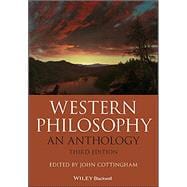About This Book
Western Philosophy: An Anthology, 3rd Edition
Western Philosophy: An Anthology, 3rd Edition, is a comprehensive and authoritative guide to the Western philosophical tradition. This celebrated anthology surveys the history of Western philosophy from its origins in ancient Greece to the work of today's leading philosophers. It provides a guided tour through the great tradition of Western philosophical thought, making it an indispensable resource for both beginning and advanced university students.
Who Uses It?
Primarily, this book is used by students and instructors in a wide range of philosophy courses at the college and university levels. It is also a valuable resource for anyone interested in understanding the key arguments and theories within the Western philosophical tradition.
History and Editions
The 3rd edition of Western Philosophy: An Anthology has been updated to include newly incorporated classic texts from thinkers such as Aquinas, Machiavelli, Descartes, William James, and Wittgenstein. Each of the 144 individual extracts is now followed by sample questions focusing on the key philosophical problems raised by the excerpt, and accompanied by detailed further reading suggestions that include up-to-date links to online resources. The introductory essay written by John Cottingham offers advice to students on how to read and write about a philosophical text.
Author and Other Works
John Cottingham is the editor of Western Philosophy: An Anthology. He is known for his expertise in the field of philosophy and his ability to present complex ideas in a clear and accessible manner. This anthology is part of the Blackwell Philosophy Anthologies series, which aims to provide authoritative and comprehensive collections of classic source materials and expert insights.
Key Features
- Comprehensive Coverage: The book covers all the main branches of philosophy, including theory of knowledge and metaphysics, logic and language, philosophy of mind, the self and freedom, religion and science, moral philosophy, political theory, aesthetics, and the meaning of life.
- Classic Texts: Includes seminal writings from ancient Greece to contemporary philosophers.
- Sample Questions and Further Reading: Each extract is accompanied by sample questions and detailed further reading suggestions.
- Introductory Essay: Offers advice on how to read and write about philosophical texts.
- Broad Scope: Self-contained parts allow students and instructors to work independently on various aspects of Western philosophy.
Detailed Information
ISBNs and Formats
- Paperback: ISBN-13: 9781119165729
- Publisher: Wiley-Blackwell
- Publication Date: July 6, 2021
- Number of Pages: 944
- Language: English
Other Editions and Formats
While there are no other editions or formats listed specifically for this ISBN, it is part of a series that may have additional resources available. For example:
- eBook Formats: Availability may vary depending on the retailer.
- Digital Copies: Some retailers may offer digital copies compatible with various e-readers.
Related ISBNs (Not Directly Related but Part of the Series)
- Blackwell Philosophy Anthologies Series: Other books in this series include various anthologies covering different aspects of philosophy.
Publication Details
- Publisher: Wiley-Blackwell
- Publication Date: July 6, 2021
- Number of Pages: 944
- Language: English
This detailed information section provides a quick reference for all the available formats and sources for Western Philosophy: An Anthology, 3rd Edition, making it easier to find and access the book in the preferred format.









